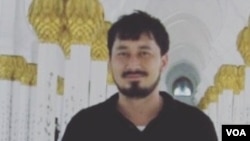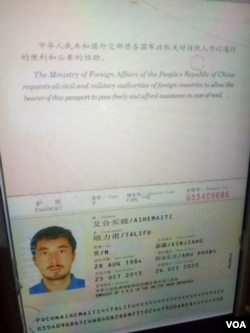Amannisa Abdulla is raising her two children, ages 9 and 4, without her husband. The 34-year-old Uyghur woman said her husband, Ahmed Talib, who is also Uyghur, was deported to China four years ago from the United Arab Emirates where he was working at the time.
“Interpol in the UAE called me and said they deported my husband on February 27, 2018,” Abdulla told VOA. She said her husband had not committed any crimes.
The People’s Republic of China (PRC) is believed to have targeted hundreds of other Uyghurs through similar methods in recent years, according to a new report, creating what researchers say is a complex system that allows Beijing to carry out its repressive policies overseas.
“China operates a global dragnet spanning 44 countries,” said Bradley Jardine, author of the Woodrow Wilson Center report “The Great Wall of Steel: China’s Global Campaign to Suppress the Uyghurs,” which details Beijing’s pursuit of Uyghurs around the world who have fled China.
The report said that since 1997, “the People’s Republic of China has engaged in transnational repression in 44 countries.” As of January 2022, there were “1,574 publicly reported cases of detentions and refoulements of Uyghurs to China, where they faced imprisonment and torture in police custody.”
The report said there have been “5,532 additional cases of China’s government targeting Uyghurs abroad using intimidation and harassment to monitor and silence them.”
Jardine said that in addition to utilizing Red Notices — an alert circulated worldwide by the International Criminal Police Organization (Interpol) regarding missing persons, people wanted for serious crimes, possible threats and other information — China has also used “everyday” tactics, including digital threats such as phishing attacks, malware and coercion via threats to relatives in Xinjiang.
Jardine added that China is most active in countries with weak rules of law and a lack of judicial transparency.
“Although China signs extradition treaties with partner states these are rarely invoked, instead, compliant states are more likely to accuse Uyghur residents of violating the terms of their immigration visas on dubious grounds and have them deported, which involves less bureaucracy and draws less international attention,” he said.
In an email to VOA, Liu Pengyu, the Chinese Embassy spokesperson in Washington, said he was “unaware” of the report and its findings of harassment and detention of Uyghurs and Kazakhs abroad. He said that Xinjiang is China’s own affair.
“We are firm in upholding national sovereignty, security and development interests. We would like to point out to those rumor makers that their lies have long been exposed. They will never succeed in obstructing the stability, development and prosperity of China's Xinjiang, and their ill intention will only end up in failure.” Liu told VOA.
“We also urge the relevant think tank and scholar to stop making up and spreading rumors, and stop misleading the public,” Liu said, referring to the Wilson Center and Jardine.
Barbaric torture
Last December, following a series of hearings about China’s treatment against Uyghurs and other ethnic minorities in the Xinjiang region, the Uyghur Tribunal, an unofficial London-based independent people’s tribunal, concluded that it was “satisfied as set out previously that within the PRC’s penal system, barbaric, cruel and sadistic torture was perpetrated.”
The tribunal stated that “President Xi Jinping, Chen Quanguo and other very senior officials in the PRC and CCP bear primary responsibility for acts that have occurred in Xinjiang.”
Dolkun Isa, president of the World Uyghur Congress, requested the independent tribunal in 2020. For 20 years, his name was on an Interpol Red Notice. He told VOA that he had felt helpless and embarrassed for the inclusion and was considered a criminal in many countries and institutions. His name was eventually deleted from the notice.
“The Chinese government has put this politically charged label on me, and this had prevented me from entering different countries and led to my detention and interrogation in South Korea, Italy, Turkey, the USA and Switzerland,” Isa said.
Deportation
Abdulla told VOA that on February 9, 2018, “the local police (in Xinjiang) came to my husband’s brother’s house and demanded Talib should send them a police clearance certificate from the UAE police.”
Abdulla said the day after applying for the document on a UAE government website, her husband “received a text message from UAE police authorities urging him to visit the local police in Sharja.”
She said her husband’s visit to UAE police was a “trap” that would eventually send him back to China. Talib was moved to Dubai, where police “took his DNA, took his blood and his urine,” Abdulla said. “They did these according to China’s request, as my husband told me.”
Abdulla said Interpol did not answer her questions about why her husband was deported.
“They said whatever crime he committed, he will take care of it in China. They said If he didn’t commit any crime, then he can come back to you after making things in China correct,” she said.
Interpol and Red Notices
When VOA reached out to the Interpol General Secretariat regarding Talib’s case, its press office responded by saying Interpol offices in each member country “can interact and share information directly without any involvement with the General Secretariat” and directed VOA to contact the Interpol office in the UAE, which is under the jurisdiction of the country’s Ministry of Interior. VOA did not receive a response about Talib’s case from the UAE Ministry of Interior after repeated attempts to reach out to them.
When asked about China allegedly using Interpol Red Notices to target Uyghurs, the Interpol press office responded to an email to VOA and said each member country determines “what legal value it gives to a Red Notice and the authority of their law enforcement officers to make an arrest.” Each Red Notice is reviewed by a task force and a notice is only released if it is in line with Interpol’s constitution that states it “is strictly forbidden for the organization to undertake any intervention or activities of a political, military, religious or racial character,” explained Interpol’s press office by quoting its constitution.
“Whenever new and relevant information is brought to the attention of the General Secretariat after a Red Notice has been published, the task force reexamines the case.”
Seeking safety
Abdulla said the last time she talked to her husband, he instructed her to find safety in Turkey if anything happened to him. It was there that she learned he was in prison in Xinjing.
Although she received refugee status in Turkey, she still fears for her children’s safety.
“A few weeks ago, I and my daughter survived a hit-and-run accident, and my son ran away after he was dragged into a black car by a stranger in front of his school,” Abdulla told VOA.
She believes that these attacks were retribution from China for her testimony to the Uyghur Tribunal and for talking to the media about her husband’s deportation.





